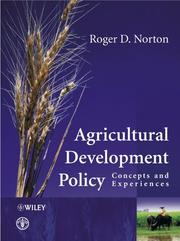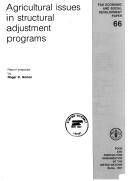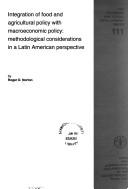| Listing 1 - 10 of 11 | << page >> |
Sort by
|

ISBN: 0470857781 047085779X 9251048754 9780470857786 9780470857793 9789251048757 Year: 2004 Publisher: Chichester : Wiley,
Abstract | Keywords | Export | Availability | Bookmark
 Loading...
Loading...Choose an application
- Reference Manager
- EndNote
- RefWorks (Direct export to RefWorks)
Agriculture and state --- Sustainable agriculture --- Développement agricole --- Agricultural development --- Politique agricole --- Agricultural policies --- Politique de la production --- Production policies --- Politique des prix --- Price policies --- Politique de soutien --- Support measures --- Politique de l'environnement --- Environmental policies --- Propriété foncière --- Land ownership --- Finances publiques --- public finance --- Gestion des ressources --- resource management --- Changement technologique --- technological changes --- Étude de cas --- case studies --- Eau d'irrigation --- Irrigation water --- Réseau d'irrigation --- irrigation systems --- world --- Yémen --- Yemen --- Agriculture and state. --- Sustainable agriculture. --- Social Sciences and Humanities. Development Studies --- Rural Development --- Rural Development. --- Yemen.

ISBN: 9251025339 9789251025338 Year: 1987 Volume: 66 Publisher: Rome FAO
Abstract | Keywords | Export | Availability | Bookmark
 Loading...
Loading...Choose an application
- Reference Manager
- EndNote
- RefWorks (Direct export to RefWorks)
Agriculture --- Agricultural credit --- Agriculture and state --- Debts, External --- Finance --- -Agricultural credit --- -Agriculture and state --- -Debts, External --- -#ABIB:FAOdeposit --- Debts, Foreign --- Debts, International --- External debts --- Foreign debts --- International debts --- Debt --- International finance --- Investments, Foreign --- Agrarian question --- Agricultural policy --- State and agriculture --- Economic policy --- Land reform --- Agricultural lending --- Farm credit --- Farm loans --- Rural credit --- Farming --- Husbandry --- Industrial arts --- Life sciences --- Food supply --- Land use, Rural --- Government policy --- #ABIB:FAOdeposit --- Agriculture - Developing countries - Finance --- Agricultural credit - Developing countries --- Agriculture and state - Developing countries --- Debts, External - Developing countries
Book
ISBN: 3031086325 3031086333 Year: 2022 Publisher: Cham Springer International Publishing AG
Abstract | Keywords | Export | Availability | Bookmark
 Loading...
Loading...Choose an application
- Reference Manager
- EndNote
- RefWorks (Direct export to RefWorks)
Digital
ISBN: 9780128092224 012809222X Year: 2017 Publisher: London, United Kingdom Academic Press
Abstract | Keywords | Export | Availability | Bookmark
 Loading...
Loading...Choose an application
- Reference Manager
- EndNote
- RefWorks (Direct export to RefWorks)
"The Competitiveness of Tropical Agriculture: A Guide to Competitive Potential with Case Studies describes and synthesizes existing methodologies for evaluating competitiveness in agriculture, introduces extensions and refinements, and provides a novel approach based on a combination of quantitative and qualitative methodologies. As exports of tropical fruit, nuts, and other high-value crops have been growing very rapidly from developing countries, but often encounter serious obstacles in their value chains, this book demonstrates how national agricultural policy is oftentimes not guided by considerations of inherent competitiveness. In addition, the book presents case studies that illustrate the application of these approaches using quantitative frameworks. A concluding chapter introduces policy considerations for competitiveness from work in Jordan, Colombia, Estonia, Peru, and elsewhere, also discussing the role of specific policies in raising competitiveness sustainably and its role in reducing rural poverty."--
Multi
ISBN: 9783031086335 9783031086328 9783031086342 9783031086359 Year: 2022 Publisher: Cham Springer International Publishing, Imprint: Palgrave Macmillan
Abstract | Keywords | Export | Availability | Bookmark
 Loading...
Loading...Choose an application
- Reference Manager
- EndNote
- RefWorks (Direct export to RefWorks)
"This is a very important book. It is must reading for anyone interested in the future of humanity, including the sources of global political instability. With great precision, Roger Norton unveils in front of our eyes ten country studies that connect structural national features with inequality and destitution. The analysis is rigorous, and the narrative is compelling. A valuable contribution to a topic that should be in everyone's minds." --Sebastian Edwards, Henry Ford II Distinguished Professor of International Economics, UCLA, USA Inequality stirs passions across the globe today, figures prominently in political discourse, generates fervid debate and popular protest, and is the theme of widely read scholarly publications. This book contributes to the burgeoning global dialogues and literature on economic inequality in a new way, identifying and addressing what may be called bedrock types of inequality whose origins are rooted in the history and culture of each country. These kinds of inequality strongly influence income distributions by strata, can be resistant to change, and require solutions beyond fiscal tax and expenditure policies. And it places the findings firmly in the realm of the relevant studies on the topics covered. The countries analyzed include South Korea, Mexico, El Salvador, Honduras, Peru, Estonia, Pakistan, Bangladesh, Nigeria, and Yemen. Roger D. Norton currently holds a joint appointment in Texas A&M University's (USA) Agricultural Economics Department as a Research Professor and the University's Borlaug Institute for International Agriculture and Development. At the Borlaug Institute he is Director for the Center for Coffee Research and Education and concurrently Director for Latin America and the Caribbean. As principal investigator in the Institute he has led three coffee development projects in Central America, including one that is current, and two projects for other products, one in the Dominican Republic and the other for twelve countries worldwide. Professor Norton earned a Ph.D. in Economics at Johns Hopkins University.
Politics --- Economic conditions. Economic development --- Developing countries: economic development problems --- Economics --- economie --- politiek --- ontwikkelingssamenwerking --- Distributive justice. --- Equality --- Social aspects.

ISBN: 9251032742 Year: 1992 Publisher: Rome FAO
Abstract | Keywords | Export | Availability | Bookmark
 Loading...
Loading...Choose an application
- Reference Manager
- EndNote
- RefWorks (Direct export to RefWorks)
Agriculture and state --- Food supply --- Government policy --- Latin America --- Economic policy.
Book
Abstract | Keywords | Export | Availability | Bookmark
 Loading...
Loading...Choose an application
- Reference Manager
- EndNote
- RefWorks (Direct export to RefWorks)
Book
ISBN: 012809222X 0128053127 9780128092224 9780128053126 Year: 2017 Publisher: Amsterdam, [Netherlands] : Elsevier,
Abstract | Keywords | Export | Availability | Bookmark
 Loading...
Loading...Choose an application
- Reference Manager
- EndNote
- RefWorks (Direct export to RefWorks)
"The Competitiveness of Tropical Agriculture: A Guide to Competitive Potential with Case Studies describes and synthesizes existing methodologies for evaluating competitiveness in agriculture, introduces extensions and refinements, and provides a novel approach based on a combination of quantitative and qualitative methodologies. As exports of tropical fruit, nuts, and other high-value crops have been growing very rapidly from developing countries, but often encounter serious obstacles in their value chains, this book demonstrates how national agricultural policy is oftentimes not guided by considerations of inherent competitiveness. In addition, the book presents case studies that illustrate the application of these approaches using quantitative frameworks. A concluding chapter introduces policy considerations for competitiveness from work in Jordan, Colombia, Estonia, Peru, and elsewhere, also discussing the role of specific policies in raising competitiveness sustainably and its role in reducing rural poverty."--
Agriculture. --- Agriculture --- Farming --- Husbandry --- Industrial arts --- Life sciences --- Food supply --- Land use, Rural --- Tropics. --- Equatorial regions --- Equatorial zones --- Subtropical regions --- Subtropics --- Tropical regions --- Tropical zones --- Earth (Planet)
Book
Year: 1975 Publisher: S.l. World Bank. Agriculture and rural development
Abstract | Keywords | Export | Availability | Bookmark
 Loading...
Loading...Choose an application
- Reference Manager
- EndNote
- RefWorks (Direct export to RefWorks)
Book
Abstract | Keywords | Export | Availability | Bookmark
 Loading...
Loading...Choose an application
- Reference Manager
- EndNote
- RefWorks (Direct export to RefWorks)
| Listing 1 - 10 of 11 | << page >> |
Sort by
|

 Search
Search Feedback
Feedback About UniCat
About UniCat  Help
Help News
News